#Survivor of Italy
Text
93 year-old holocaust survivor, activist and Senator for life, Liliana Segre, declared that accusing Israel of genocide is an insult - specifically, she used the word "bestemmia", the Italian term to indicate profanities said against God.
My expectations were low, but holy fuck...
#not a holocaust survivor siding with literal nazis who do the same shit as those who put her and her family in concentration camps??#liliana segre#free palestine#italy#italia#holocaust
4 notes
·
View notes
Text
World War II Survivor
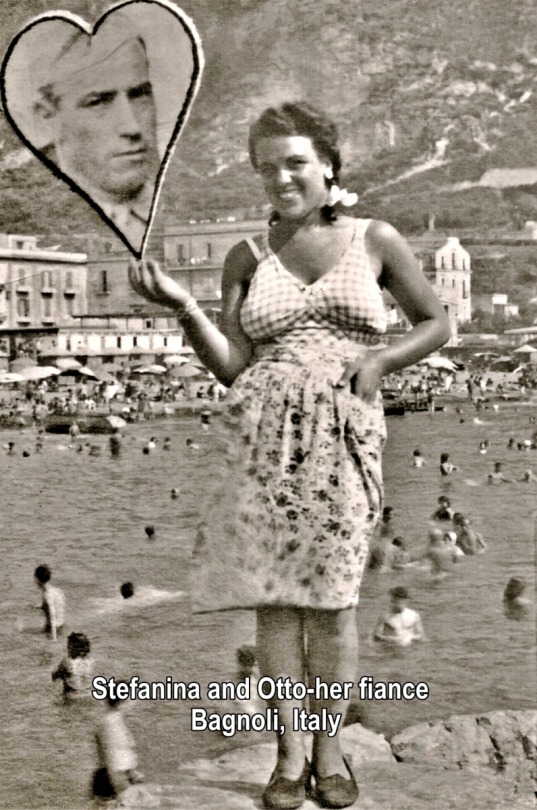
View On WordPress
#Christian inspirational#faith#Fascism#History#inspirational story#Italian campaign#Naples Italy#Survivor#War story#World War II#World War II survivor
1 note
·
View note
Text
before yom hashoah ends, i want to remind folks that sephardi, maghrebi, and mizrahi jews were also deeply affected by the holocaust.
this is by no means inclusive of all communities who were affected by the holocaust and its aftermath, i do not have the emotional bandwidth for that, but hopefully this gives you some insight into jewish experiences outside of what's usually talked about.
the jews of morocco, algeria, tunisia, libya, and italy were all subjected to the racial laws of the vichy regime or fascist italy, which prevented them from attending educational institutions, holding public office, and owning businesses and sometimes property. moroccan jews were protected from some of the violence faced by other jews of the mediterranean and north africa because of the moroccan sultan mohammed ben youssef, who was vocally opposed to the anti jewish laws. he reportedly told the vichy government, "there are no jews in morocco. there are only moroccan subjects." he believed he had a god-given responsibility to protect moroccan jews. "moroccan jews are my subjects, and it is my duty to protect them against aggression."
unfortunately, other jewish communities did not receive that kind of protection. algerian jews faced a pogrom by the local arab population in constantine, killing 25 and destroying several jewish homes and businesses. 2000 algerian jews were sent to concentration camps in bedeau and djelfa, where many died from hunger, exhaustion, disease, or beatings. 5000 tunisian jews were forced into labor and detention camps where over 400 of them were killed. in libya, there was a violent pogrom which killed 500 jews out of a community of 4000. 2600 of the survivors were sent to the giado concentration camp, of which 526 died. in tunisia, there was a violent pogrom which killed over 130 jews (including 36 children), injured hundreds, and left 4000 homeless. italian jews faced pogroms, the jewish ghetto in rome was raided and over a thousand jews were detained and sent to concentration camps. a total of 7680 italian jews out of a population of nearly 45,000 were killed.
in greece, thousands of jews were deported to auschwitz. as many as 50% died en route, and only 10,000 out of over 75,000 survived, a nearly 90% death rate. their homes were looted and their property was stolen, and when the few survivors tried to return after the war (a difficult task as the greek foreign ministry attempted to delay or prevent their return to greece), most were unable to regain their property and possessions, forcing most to seek asylum in israel or other countries.
egyptian jews were not directly affected by the axis powers, but extremist organizations like young egypt and the muslim brotherhood sympathized with the nazis and even secured nazi funds to distribute thousands of antisemitic propaganda pamphlets. sporadic pogroms took place throughout the 40's, stoked by political leaders like mahmoud an-nukrashi pasha who said to the british ambassador, "all jews were potential zionists" and dr heykal pasha who said "if the u.n. decides to amputate a part of palestine in order to establish a jewish state, ... jewish blood will necessarily be shed elsewhere in the arab world ... to place in certain and serious danger a million jews." this political extremism prompted the 1948 cairo bombings that killed 70 jews and wounded 200, with many more being killed in the riots following, and eventually led to the expulsion of nearly all egyptian jews, whose money and posessions were all confiscated by the egyptian government.
similar political persecution was directed at iraqi jews, leading to the farhud, a pogrom which killed 180 jews and forced tens of thousands to flee. though there were many who did not support the nazi regime or agree with their views, there were just as many in arab countries who did, in no small part because of active effort by the nazis to gain sympathy from arab populations who already did not get along with their local jewish populations. this led to several other pogroms that took place in the 30's and 40's across lebanon, syria, and british mandate palestine, including a pogrom in jaffa which killed 9 jews and forced 12,000 jews to flee, and another in tiberias which killed 19 jews (including 11 children), most of whom were stabbed to death.
it's understandable that most of what the general public knows about the holocaust is the stories of ashkenazi jews from central and eastern europe, because they comprise the vast majority of the victims. hopefully, this encourages you to do further research into the ways other parts of the diaspora were also affected.
1K notes
·
View notes
Text
*ੈ✩‧₊˚ STUDY BREAK (OP81)
pairing: oscar piastri x f!student!reader
summary: oscar piastri is a formula 1 driver. y/n is an international relations student. her friends find her relationship pretty hard to believe. especially when she can’t tell them any details for you know… nda reasons.
warnings: main characters friends can be jackasses. mentions of international relations for any of my fellow bach survivors who shiver at the mention of the course
* faceclaim: scarlett leithold (but please imagine her as you see fit!)
yourusername just posted a photo *ੈ✩‧₊˚

liked by oscarpiastri, yourbsf and 276 others
yourusername summer break you were fab
view all comments
yourbsf wow you took international relations literally huh
yourusername call it research
friend1 IS THAT A PRIVATE JET? IS UR DAD RICH RICH?
friend2 girlie where are you getting all this money from i know uni debt is killing you like the rest of us
yourusername rich boyf perks😙
friend2 this ‘boyf’ who we conveniently haven’t met?🤔
oscarpiastri just posted a photo *ੈ✩‧₊˚

liked by yourusername, landonorris and 193,209 others
oscarpiastri good company, good racing🤙🏻
view all comments
user luv u oscar
user YOU’LL COME BACK EVEN STRONGER KING
user you seemed so happy today :’)
user ppl are saying he had a girl w him👀
yourusername cutie
friend2 your boyfriend seeing you comment on random celebs posts…🤭
texts with oscar *ੈ✩‧₊˚

yourusername just posted a photo *ੈ✩‧₊˚

liked by oscarpiastri, yourbsf and 300 others
yourusername term 1 you’ve been cute
👤 tagged yourbsf, friend1, friend2, friend3
view all comments
friend3 can’t believe ur not in lectures next week bc ur off to go watch cars go vroom vroom 🙄
yourusername gotta support my boy what do you want from me
friend3 sure jan
yourbsf first pic is HOT send it to me rn
friend1 tagged but not pictured… just like ur boyfriend
yourusername just posted stories *ੈ✩‧₊˚

oscarpiastri just posted a photo *ੈ✩‧₊˚

liked by yourusername, landonorris and 194,256 others
oscarpiastri race✔️ time to explore⏳
view all comments
landonorris oscar has rizz?
user your captions say so little yet so much
user HE HAS A GIRLFRIEND????
friend1 @/yourusername ur heart must be breaking
yourusername ????
friend1 he’s got a girllllll
user lando speaks for us all HUH
your group chat *ੈ✩‧₊˚

yourusername just posted a photo *ੈ✩‧₊˚

liked by yourbsf and 361 others
yourusername bit of fun before back to reality :)
view all comments
yourbsf look cute who’s your photographer
yourusername os🥰
friend3 girl is the shirt meant to prove something
friend1 i am saying nothing other than ur cute (and delusional)
texts with your best friend *ੈ✩‧₊˚

yourusername just posted a photo *ੈ✩‧₊˚

liked by yourbsf, landonorris and 278 others
yourusername does it count as a date if it’s his full time job?
view all comments
friend1 girl… this may be going too far
yourusername literally what do you want from me ????
yourbsf i’m happy to be your third wheel as long as i get maid of honour duties
friend2 don’t encourAGE HER
yourbsf just posted a photo ੈ✩‧₊˚

liked by yourusername and 410 others
yourbsf ode to my best friend and her boyfriend (ft. me) who are sickeningly adorable but cause me more stress than is worth it
view all comments
yourusername WHEN DID YOU TAKE THESE
yourbsf WHEN YOU WERE BEING ALL GROSS
yourusername also the pic of us is so cute🥹
yourbsf you weren’t kidding when you said the boy is a good photographer
your group chat ੈ✩‧₊˚

texts with oscar ੈ✩‧₊˚

yourusername just posted a photo ੈ✩‧₊˚

liked by oscarpiastri, yourbsf and 301 others
yourusername more from summer because i miss italy and i miss being trackside
view all comments
friend3 this was a weak attempt to convince us
friend1 bby… just confess it’s okay
oscarpiastri pretty girl
liked by yourusername
friend2 oh
friend1 huh. interesting
your group chat ੈ✩‧₊˚
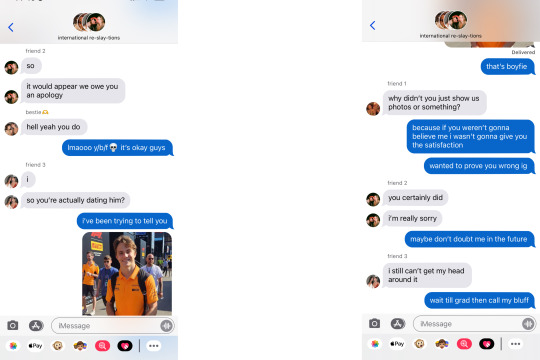
oscarpiastri just posted a photo ੈ✩‧₊˚

liked by yourusername and 201,456 others
oscarpiastri graduation party or a chance to show off to her friends that i actually exist? who knows. proud of you baby🧡
👤 tagged yourusername, yourbsf, friend1, friend2, friend3
view all comments
user mr piastri i must confess my love for ur girlfriend
friend3 i humbly accept that i was wrong
yourbsf wish i could have taken a photo of their faces when you walked in lmao
user i love her already LOOK AT THAT SMILE
yourusername i lurv uuuuu
landonorris gross go back to being a secret
yourusername gonna make out w him in front of you
landonorris I SWEAR TO GOD Y/N. OSCAR CONTROL YOUR GIRLFRIEND.
oscarpiastri i’ll keep her feisty thanks
yourusername just posted a photo ੈ✩‧₊˚

liked by oscarpiastri, landonorris and 3,409 others
yourusername a hot boyfriend who exists✔️ a degree✔️ a killer ass✔️
view all comments
oscarpiastri fun fact the last part is only one of my favourite things abt you
yourusername aw you’re so romantic os
oscarpiastri nothing but the best for you
friend1 i can’t believe he exists
friend2 i can’t believe oscar piastri spoke to us
yourusername said with all the love in the world, SUCK MY DICK
user i’ve only just been introduced to this friend group and i already love them
———
a/n: first oscar post EEEE
this was meant to be a lando one shot first but author is: in hospital, so i hope this is okay for now😭
taglist (found HERE): @iluvvmeeee @champagnelovers101 @alessioayla @idkiwantchocolatee @skatingiswalkingincursive @six-call @he6rtshaker @hobiismyhopeu @tallrock35 @sunflower-golden-vol6 @woozarts @minkyungseokie @vellicora @tsukishitm-a @lucyysthings
#f1 x reader#f1#oscar piastri#oscar piastri x reader#oscar piastri x you#oscar piastri smau#oscar piastri imagine#oscar piastri one shot#oscar piastri scenario
2K notes
·
View notes
Text
Holocaust Testimonies
Mara Ginic and mother Johanna Ctvrtnik on the island of Hvar, Croatia, May 1941.
Mara Ginic (now Kraus) was born in Zagreb, Yugoslavia in 1925. At the age of 3 or 4 she moved with her grandparents to Osijek, Slavonia(Nowadays in Croatia). When she was five years old her parents divorced and her mother moved to Belgrade, but she stayed with her father and grand parents in Osijek. When she was 8…
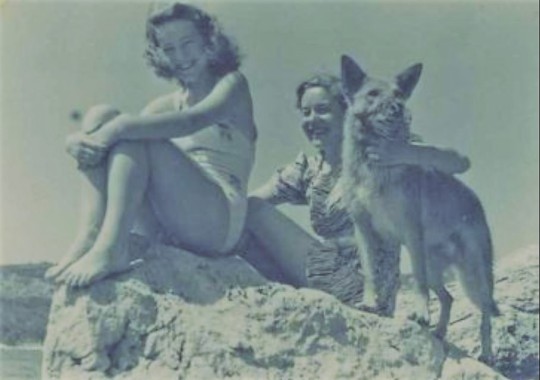
View On WordPress
1 note
·
View note
Text
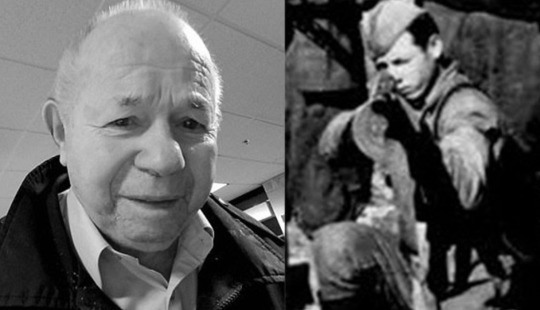
THURSDAY HERO: Benjamin Levin
Killing Nazis at age 14
Benjamin Levin was a young resistance fighter who, as one of the notorious “Avengers,” spent World War II hiding in a Lithuanian forest, emerging only to kill Nazis or bomb their supply chains.
Benjamin was born in Vilna in 1927. His father Chaim was a successful businessman and the family lived a comfortable life. In 1941, however, Chaim was tipped off that Nazi Germany was about to invade Lithuania. As Jews, that meant the Levins’ days were numbered. Chaim quickly sold his business at a loss, used the proceeds to buy weapons, and went into hiding with his family.
At the time, Benjamin was a 14 year old juvenile delinquent who’d started smoking at age 8 and was member of a street gang. After the German invasion, he chose not to stay with his parents in their hiding place, instead joining the fierce resistance group known as the “Avengers” led by Abba Kovner. Benjamin was an immediate asset to the group due to his unique combination of exceptional bravery and diminutive size. His baby face and unassuming appearance enabled him to avoid attracting attention, even in enemy territory.
Hidden in a Lithuanian forest, the teenager and his fellow Avengers killed Nazis, bombed their transportation lines, and smuggled life-saving food and medicine into the Jewish ghettoes. It was later estimated that the brave band of guerrilla fighters had killed 212 Nazis. Their policy was “take no prisoners.” In 1944, the Jewish fighters helped the Russian army liberate Vilna, after which they marched through town looking for Nazi collaborators to execute.
Benjamin’s parents survived the war in hiding, but when they returned to Vilna to reclaim their home, their former neighbors murdered them on the spot. With nothing to keep them in Europe, Benjamin and his sister moved to pre-state Israel, where he joined the Jewish militant group Irgun, fighting the British occupation of Palestine. Benjamin was in charge of helping Jewish survivors in Europe relocate to Israel. Benjamin’s street smarts and people skills served him well as he traveled through Turkey and Syria with European Holocaust survivors.
The Soviet army did not appreciate Benjamin’s work rescuing Jews from behind the Iron Curtain, and in 1947 he was arrested and sent to a Siberian gulag. After a year, Benjamin was released from the gulag and hitchhiked his way to Southern Europe, where he reconnected with the Irgun in Italy. The organization arranged for him to enroll in college and earn a degree in mechanical engineering. He was assigned to the engine room of a ship that sailed around the world, collecting money, weapons and volunteers to fight for the Jewish state.
The ship was called Altalena, and headed to Israel with hundreds of Holocaust survivors on board, as well as Jewish volunteers from around the world, and a cache of heavy ammunition secretly donated by France. When the Altalena reached Tel Aviv and tried to dock, the ship came under fire by the Haganah, a rival military group. Under machine-gun fire, young Benjamin leapt off the ship and swam to shore, then snuck into the country unnoticed. He had been through so much in the previous several years, had lived so many lives and assumed so many identities, that he actually forgot his own birthday. Later, he decided to make Passover – the festival of freedom – his official birthday.
Benjamin met his wife Sara, a Hungarian immigrant, in Israel, and ironically she was serving with the Haganah when they fired on the Altalena. Together they had two children, and moved to New York in 1967, where Benjamin worked as a mechanic and owned a gas station. In the 1990’s, Benjamin was interviewed extensively by Steven Spielberg as part of the Shoah Foundation oral history project.
For decades, Benjamin was an in-demand public speaker at New York high schools, where he spoke about the Holocaust and his remarkable life. Toward the end of his life, Benjamin was unable to speak, but he insisted on continuing his school appearances, with his son Chaim – named for Benjamin’s father – doing the speaking for him. Chaim remembered how much Benjamin loved interacting with students, and described his father as having “an enormous amount of energy and joy and love.”
Benjamin Levin died on April 13, 2020 at age 93. The last survivor of the Avengers, Benjamin died during Passover – his adopted birthday.
For heroically fighting Nazis and saving European Jews, and for educating generations of New York schoolchildren about the Holocaust, we honor Benjamin Levin as this week’s Thursday Hero.
152 notes
·
View notes
Text
To add to the current trend of calling out the bullshit that Zionists spout, here's a collection of not so fun facts for my friends outside of Italy.
Some of you may have heard of how Ghali, one of the most famous singers in Italy who is of Tunisian descent, has been criticized by Israel's Ambassador to Italy Alon Bar, who accused him of spreading hate just because he called for a ceasefire in Gaza. Then to remind us all of how much of a grip on the balls of our entire nation Isr*el has, a letter recounting the October 7 happenings was read on air to "balance" things out politically speaking (as our useless Deputy Premier and Foreign Minister stated, whatever the fuck that means). On his part Ghali responded with confusion and honesty, simply saying that as an artist he's always going to use his platform to talk about what he thinks is important, besides the fact that he's always been supportive of the Palestinian people since he was a kid (thus reiterating how their struggle has NOT started on October 7). In no part he ever invoked anything but peace, and yet he sparked controversy.
Of course what this episode merely sheds light on is the shameful and blatant climate of selfcensorship that has taken over the Italian mainstream media. It's not even an isolated accident: just days prior another contestant of the Sanremo festival, Dargen D'Amico, was attacked by the mainstream press after he dared take a minute after his exhibition to remind everyone that with our silence we are all complicit in the deaths of countless children right now. Sure enough he was forced to apologize "for getting political" the very day after.
To protest this cowardly and disgusting attitude that has become the standard in Italy, a peaceful sit-in was organized today in Naples in front of RAI (the public TV network that broadcast the Sanremo festival and that is funded with tax payers' money). After the protestants tried to hang a pro-Palestine banner on the fence of the building, police brutality quickly ensued and several people got hurt after being hit in the head with batons (you can find a video of the whole scene unfolding here).
So the thing here is that you can see how the top brass of our government desperately wants us all to just be complacent in the killing of Palestinians at hands of Isr*el. Much like what happened with the bombing of Rafah carefully made to overlap with the Super Bowl, the pro Isr*el Western governements very much hope that our silence can be bought with as little as good old panem et circaenses. And I've gotta say, at least in the case of Italy, it's almost like in doing so they forget how we young people were taught about genocide in the first place.
They drilled an acute awareness of what genocide looks like into each of our heads throughout our whole grade school life. We would hold our yearly minute of silence for the victims of the Holocaust on Remembrance Day without fail, we would read "Se Questo È Un Uomo" by Primo Levi as early as eight grade and analyze it thoroughly. We would study Hannah Arendt's philosophy while focusing especially on her ideas about the banality of evil that she witnessed during the Nuremberg Trials. Most high schools organized mandatory conferences with Holocaust survivors as speakers and visits at the local synagogue, as well as extra curricular activities (I'm talking weeks long train trips to Dachau and other concentration camps while accompanied by members of survivors associations and historians) to further spread awareness about the horror of the Holocaust and make sure that we would never let it happen again, that we would take a strong stance against it if the situation ever called for it.
And now we are living through the first genocide that's being documented live for the whole world to see and yet apparently nobody can say nothing about it. The countries that so far have taken a strong stance against Isr*el are so few it's absurd considering the enormous amount of damning evidence of war crimes, human trafficking, and ultimately ethnic cleansing that Isr*el is carrying out. It's even more absurd if you think of how casual the Isr*elis are about all of this, perfectly knowing that as long as they are backed by the world's largest powers they are basically untouchable. The banality of evil for real.
But here's the thing. Isr*el is just a country run by the military and made up of brainwashed ultranationalist colonialists, who think it is their birth right to kill every last Palestinian and mock their suffering because that's what they've been told confidently their whole lives. They think that the suffering their people lived in the past made them beyond moral reproach today, that their right to self-defense can spill over to offense and nobody will ever blame them, and they are so convinced of this that they will respond to actual accusations of genocide and war crimes simply by saying "that's antisemitic" and moving on.
Even just recalling the words of Holocaust survivors who spoke up about genocide has stopped clicking in the heads of many people because they see everything pertaining to the Jews as exceptional in its political, social, and historical dimensions, even when it's not. To better explain what I mean let me summarize another fun fact from very recent happenings in Italy. This last January 27, on Remembrance Day, several protests by young people of Palestinian descent and other supporters were held in various cities to condemn Isr*el's actions in Palestine, despite having been forbidden for "security reasons" after some complaints of the Jewish community called for the protest to be rescheduled. Some of the words that were written on the banners that the protestors held are quotes of Primo Levi, a writer and Holocaust survivor who passed in 1987. The aftermath of the protests was basically centered around Noemi Di Segni, the president of the Union of Italian Jewish Communities (UCEI), who said that the remembrance of Levi's words should be left to Jews, and then called for an end to the "verbal violence" against Jews that pro Palestine stances imply.
"Cease the fire of words against us is what we say to those who continue to accuse Israel of war crimes and genocide, with slogans based on nationality and faith, giving credence only to Hamas propaganda and giving new life to prejudices that we had hoped were extinct," Di Segni said. She also said that this kind of "Islamic suprematism" should look for quotes elsewhere, basically.
The funny thing here, however, is that the words that Levi originally spoke and that Di Segni and many other Zionists say have been "appropriated" by Palestinians were words that were never meant to be exclusively related to the Holocaust and the persecution of Jews specifically. All the contrary, they invite caution especially by reiterating that everyone needs to retain awareness of the horrors of genocide, because anyone (even Jews themselves in theory) could let such unspeakable things happen again if they let themselves forget. These are the words:
"Se comprendere è impossibile conoscere è necessario, perché ciò che è accaduto può ritornare, le coscienze possono nuovamente essere sedotte ed oscurate: anche le nostre". (trans: "If understanding is impossible then knowing is necessary, because what happened can come back, the consciences can again be seduced and obscured: even ours.")
This is important because to imply as Di Segni did that the Holocaust is a self contained episode in history, that words of warning against genocide in general can only be used in the context of a particular genocide that happened over 75 years ago, is the exact opposite of what survivors like Levi wanted the world to think.
The title Levi gave to what his English-language publishers called “Survival in Auschwitz” was “Se Questo È un Uomo” (“If This Is a Man”). The Nazis’ crime, he believed, was to treat the Jews as if they weren’t men—human beings. But the Jews’ suffering, he said, did not make them better people, or give them special rights. They had to observe the same moral standards as anyone else. Levi abhorred what we now call “exceptionalism.” This affected his views on Israel. He repeatedly condemned the Israelis’ treatment of the Palestinians. When, in 1982, the Israelis stood by as the Christian Phalangists massacred the Palestinians at Sabra and Shatila, he called for the resignation of Ariel Sharon and Menachem Begin. “Everybody is somebody’s Jew,” he told a reporter, Filippo Gentiloni, from the Italian newspaper Il Manifesto, and he cited the abuse of Poland by the Russians and the Germans. At that point in the interview, printed on June 29, 1982, Gentiloni closed the Levi quote and added a sentence of his own: “And today Palestinians are the Jews of the Israelis.”
Anyways, keep calling things as you see them. It may piss off some people, but it's the only way things can actually start to change in such a mud pool of empty politics and performative activism such as what we're witnessing in most Western countries.
122 notes
·
View notes
Text
A Theoretical Lore Bible of Caesar’s Legion as a Nation
Hello good citizens of Tumblr! I’ve been on a Fallout: New Vegas kick lately, and I recently graduated college with a bachelors degree (major illustration, minor history of art and western civilization). So now that I’m certified to draw dick AND talk about Ancient Rome, I have things to yap about.
Have you ever looked at Caesar’s Legion and wondered how the more intricate aspects of their society model after the Roman Empire? Because I have! And because of those very musings, I have come up with a little dumb idiot theoretical lore Bible on how The Legion might function as a more developed nation, using my back knowledge of western civ and Roman art and culture. Nomenclature, societal structure, industries, imports and exports, the whole nine yards!
DISCLAIMERS: I have not looked through the writers’/directors’ social media accounts thoroughly enough yet to confirm if any of the information I’m bringing to the table is already solidly canonical or solidly non-canonical in the lore of Fallout: New Vegas. There is a nonzero chance I may say something that someone in charge has already said, or something that’s already been disproven or denied. If you catch something I don’t, let me know! I like worldbuilding for fun like this, and I want to keep everything as lore-cohesive as possible to challenge myself. I’ll come back to edit this every now and then if I come up with more cohesive lore pieces, or if you guys have any suggestions that would tie in the lore better. In addition, Caesar’s Legion is an inherently totalitarian nation that supports itself on some pretty sexist and bigoted social structures. There is no universe in which I support, condone, or otherwise encourage any of the ideologies of Caesar’s Legion in real life. Don’t become a tyrant dictator of a military slave nation, kids!
CONTENT WARNINGS: Discussion of slavery, sexism, physical and verbal violence, unsafe medical practices, brainwashing/psychological abuse, and death.
Without further ado, the absolute wall of text that is the theoretical lore Bible of Caesar’s Legion. Enjoyyyyy!!
CHAPTERS:
I: Citizenship
- How To Become a Citizen
- Social Castes
- Names
II: Everyday Life
- Common Social Customs
- Household Structure
- Settlement/Town Structure
- Clothing, Hair, and Accessories
- Languages
III: Industry
- Jobs
- Imports and Exports
IV: Politics, Education, and Religion
- What Senate?
- In The Unlikely Event of a Transfer of Power
- Common Political Beliefs
- Male vs Female Education Standards
Walk and talk with me about the ways The Legion mirrors, juxtaposes, and takes inspiration from Ancient Roman society in a post-apocalyptic setting.
The first time I encountered Caesar’s Legion in game, my initial thought was “What about the American West makes these people think this is the perfect spot to reinvent Italy?” it’s a barren, land-locked desert with only one or two significant water access points. Italy is a peninsula in a temperate climate with high mountain ranges and verdant forests. Most of this was a jokey thought, but then it struck me that a phalanx would actually be an insanely powerful force in a flat landscape. It all started coming together from there in a most dreadful shape
I: Citizenship
- How to Become a Citizen
Caesar’s Legion is a colonialist nation. They gain land through conquest, typically, and have a tendency to try and homogenize the culture to their liking. Generally speaking, after a town has been conquered, people who willingly surrender or submit to The Legion are given an opportunity for citizenship. Any survivors of conquest that aren’t willing to surrender are either executed or sold into slavery. Slaves are not considered citizens, because the rights and freedoms of a slave do not reflect the rights and freedoms that The Legion offers to those who can be put to better use or are complacent with the mission of The Legion.
Once one is offered a chance for citizenship, the highest ranking general in whatever battalion just took over that person’s land will evaluate if the person can be put to work, put on the battlefield, or is generally useless. Remember, an offer isn’t a guarantee. There is a chance someone who is offered citizenship may be evaluated as useless and sold into slavery regardless of their complacency. Protesting the verdict typically increases the chance of spontaneously being executed, or, if one doesn’t like their proposed role of worker or soldier, being demoted from potential citizen to slave.
If the general regards one as fit to work or fit for the battlefield, these “half-citizens” (media populi for plural, and media persona for singular) will be assigned a new legal name after a record of all new media populi is sent from the general to the regional Vilicus (overseer ;) we’ll elaborate more on this in chapter II), and given the task of minimum 400 hours of what we would understand as “community service” before the Vilicus confirms their citizenship. This “community service” is called pentimento, or repentance. It’s a form of brainwashing in which The Legion is in a position to repeatedly reaffirm that the media persona has more value here helping The Legion than they ever did as a free settler in New Vegas before, and instills dynamics that empower and encourage violence against people of “lower status” (slaves and women, usually). Kinda like a Stanford Prison Experiment that’s purposely designed to cause power dynamics instead of accidentally stumbling to the conclusion. Pentimento may include anything from helping re-pave and clear trade routes in Legion territory, to catching runaway slaves. Each media persona is given a number of tasks to complete per month, and each failed task results in more hours being added onto the total pentimento before citizenship is granted. The number of initial hours of pentimento a media persona needs to do may vary depending on the whims of the Vilicus, how much they resisted Legion control in the past, how many tasks of pentimento they leave incomplete per month, and whether they are masculine or feminine presenting, but is never less than 400 to start. Most media populi end up with starting numbers in the 600s or 700s.
Once the pentimento hours are complete and approved by the Vilicus, the media persona becomes a citizen and is expected to continue the service to the growing empire through either the trade they work in, or through service in the army. However, there is a several-month-long window of time in which spies occasionally visit the new citizens’ homes to monitor them for suspicious activity. In this window of time, spies may be looking for signs that indicate the new citizen is an agent from a rival faction sent to infiltrate The Legion. Only high-ranking officials know about this window. One can lose their citizenship and be returned back to status of media persona if they show suspicious behavior during this time, or worse, be demoted from citizen to slave. In cases where there is undeniable evidence that a new citizen is an agent for a rival faction, the citizen is immediately put to death, and their citizenship is revoked (though revoking the citizenship of someone being put to death is a little redundant).
A baby born into a family of two Legion citizens is automatically also a citizen, and must be given a name in line with Legion naming conventions (which will be discussed next segment). A baby born into a family in which the mother is not a citizen and the father is a citizen will also be considered a citizen. A baby born into a family in which the mother is a citizen and the father is not a citizen will not be considered a citizen at birth. A baby born to a family of two media populi or two slaves will not be considered a citizen at birth.
A person who willingly enters Legion territory and requests citizenship will follow the same steps as how a person from a conquered land would be evaluated for citizenship.
- Social Castes
Social Castes in Caesar’s Legion are determined by how useful one is to the empire, and whether one is male or female. The more sexist aspects of the caste system stem from the fact that women in The Legion can’t serve in the military, and the military is a notably higher status than most other castes since Caesar’s Legion is a military state.
Of course, Caesar is the highest on the social pyramid, followed by his chosen officials (take Lanius for example), then chosen guards (praetorian guard). The military comes next, with the social hierarchy of the military following that which was established in the Roman Empire in the early establishment of Caligula’s reign. After that, religious officials (which act as pseudo-indoctrinators into The Legion, and therefore are pretty essential to brainwashing the next generation of Legionnaires). Then, the Vilici, the overseers of each region/settlement. Next, the average male citizen and then, the average female citizen. Media populi come next, and following that social caste is performers (which serve very little purpose in the eyes of Caesar and the goal of conquest), with male performers having marginally more respect among the populous than female performers. Second to last is slaves, once again with males being just a little more respected than females, but what does that matter when both are going to be abused by the upper castes anyways. At the very bottom of the social ladder is outsiders and criminals, which need to be broken before earning even a sliver of humanity in the eyes of The Legion.
Caesar > Chosen Officials > Chosen Guard > Military (with sub-hierarchy of Ancient Roman military) > Religious Officials > Vilici > Average Citizen > Media Populi > Performers > Slaves > Outsiders and Criminals
- Names
The average citizen in Legion territory wouldn’t need to immediately use their new assigned name (since there’s not enough force immediately available to actually push that, the nation is still growing), but The Legion will give them a “legal” name that they’ll be addressed by formally, and in the best case scenario, the original name will be effectively waned out because it simply doesn’t matter in comparison to the new one.
A praenomen acts effectively as a first name one uses around close friends and family, while a nomen (while acting as a last name) becomes what one is more commonly known by in public. The average citizen will usually have a nomen at least, and a male citizen will have a praenomen and nomen.
- MASCULINE: A classical Latin praenomen will be assigned equivalent to the meaning or phonetics of the new citizen’s first name. The nomen will be determined based on either phonetic/meaning equivalent of the last name, or based on the new citizen’s occupation.
- FEMININE: No praenomen will be assigned. The citizen’s title will be a feminized variation of their father’s nomen, differentiated in generation by number nomenclature (Major, Minor, Tertia, etc). If they have no father, they will assume the feminized nomen of a living male partner that is already a Legion citizen. If they have no living Legion family, they will be assigned the name “Romana” and likely be either sold into slavery or auctioned to a bachelor to gain a proper nomen.
For example: Marcus Gaius has two daughters. The eldest daughter is Gaia Major. The youngest daughter is Gaia Minor. Gaia Minor meets Decimus Junius, and they get married. Now Gaia Minor is named Junia. Gaia Major remains unchanged.
Legion soldiers have more dignity in society, and therefore have all the previous conventions, plus a cognomen. Since all Legion soldiers are masculine, differentiation between masc and fem naming conventions is irrelevant from this point forward. The nomen of a soldier may be akin to the structure of how an average citizen’s would be given, or if the soldier shows exceptional prestige and has no remaining male family, a nomen referencing warfare or combat will be assigned to them (Marcus, Augustus, Drusus, etc.).
A Legion cognomen acts effectively as a Roman military callsign. Cognomens follow classical Roman conventions. The cognomen will be used most frequently in a military setting.
II: Everyday Life
- Common Social Customs
Many Roman social customs are adopted into Legion life. For example, the entertainment at the colosseum is mimicked in the tourneys in the various arenas scattered throughout Legion territory. However, because of the key difference in that The Legion isn’t even pretending not to be a totalitarian dictatorship, there are a number of drastic differences between Roman social customs and Legion social customs.
Because of how respected the military is in Legion society, it is commonplace to show soldiers with utmost reverence. It’s customary to allow soldiers to stay in a citizen’s place of residence if the soldier requests it, and it’s customary to refer to the soldier by their military rank, not their nomen or cognomen (especially if the soldier in question is on duty). It’s considered rude or inappropriate to question the motives of a soldier, or prevent a soldier from accessing areas of a citizen’s property. Such transgressions can potentially be met with violence.
One may frequently see slaves struggling to keep up with workloads. It’s taboo, but not punishable to help them, as long as it doesn’t interfere with the productivity of one’s own work. After all, The Legion gains nothing from incomplete work. If helping a slave means increasing efficiency, then it’s appropriate, but a citizen may get strange looks from others for doing so.
Utilitarianism is the ideal philosophy under which everyone should function in an ideal Legion society, but this is clearly not the case nor the environment to foster it. Social norms are based strongly on class, and in most cases, selfishness prevails because selflessness can be seen as weak (or worse, suspicious) by trigger-happy soldiers and spies.
But hey, at least sex isn’t considered a super taboo topic or activity in Legion society. Got that much going for them. Granted, it’s seen more like a conquest, but at least it’s not seen as a sin. Woohoo? Lets go? Kinda? One step forward two steps back.
- Household Structure
A household in Legion territory for a citizen of average means will likely be similar to any other household in New Vegas (with the addition of slaves in wealthier households). Where things start to get confusing is the aforementioned situation of soldiers being allowed to invade households at will. Psychologically, these soldiers are deprived of a lot of comforts the average citizen may have. There is a decidedly nonzero chance that soldiers can show up like stray cats and keep coming back in the event that a citizen is interesting enough to them. Soldiers sometimes “claim” houses or small patches of territory they frequent as a substitute for the emotional interaction they lack. Humans are social creatures. The soldiers might not know why they want to keep coming back, but they do keep coming back. Parasocial.
Generally, a woman’s domain is the household in Legion territory. While the society is by no means matriarchal, it’s customary for a woman to maintain control over most happenings within a household. This often means a woman will need to interact with stray soldiers more frequently. Among female citizens in Legion territory, these soldiers are called catuli (singular catulus) for their presence and tendencies, though this is always in secret due to the harsh punishment of misrepresenting a soldier’s status to his face. A household can sometimes have up to three catuli claim it before fights start to break out among them about perceived territory.
It is expected for a couple in a household to have children. Cultivating multiple generations of soldiers is part of how The Legion grows most efficiently, because children are impressionable enough to instill Legion values without struggle. If a household does not have a child after several years of partnership, it is considered suspicious and the male of the partnership is encouraged to be unfaithful or open the relationship. While there are no consequences for not having children, there is intense pressure to do so.
- Settlement/Town Structure
As mentioned before, the equivalent of a mayor in each region is called a Vilicus, or an overseer. The Vilicus is responsible for tallying the census, assigning names to media populi, approving the pentimento of media populi, keeping track of production rates of resources from citizens, keeping a lookout for disease outbreak so a region can be quarantined if needed, and monitoring the citizens in each region for minor suspicious activity to report to those higher in status. Each town is also occupied by a heavy military presence, to intimidate citizens into productivity and complacency.
Most of the time, Legion towns are made of the previously conquered settlements now added to Legion territories. Building more houses is an avoidable expenditure if they just repurpose the structures already there with a few modifications. Despite the multiple depictions in-game of Caesar’s Legion showing little to no care about what damage they cause, it would make sense that the depictions in the gameplay are actually the outliers in the situation, since it’s far more efficient to leave the settlements intact and just gut and reconfigure the purpose.
There are also multitudes of mobile scout settlements, mostly made of fabric, tarp, and hide tents that can be easily condensed and moved in the event that the camp is compromised. In many cases, these camps are set up as a base to return to in order to stage an invasion of new territories. If possible, The Legion sets them up close to large landmasses like plateaus or mountains for additional cover in the event of an ambush. If that’s not available, The Legion makes settlements like this close to preexisting towns in order to make the wordless threat of “push us back, and innocents die”. Generally, very few citizens are taken on these excursions, but if the plan is to stay out longer, citizens who are medics may be involuntarily drafted into going with the scout team.
- Clothing, Hair, and Accessories
The Legion isn’t a necessarily materialistic society that allows a lot of room for personal expression. Since the goal is to create a homogenous society and culture, self expression through visual cues is often muted at best and absent at normal. Makeup, perfumes, and hair styling products are prohibited if they have any synthetic qualities or materials. In many cases, beauty products are exclusively reserved for performers, and even still, only natural pigments and materials would be permitted. Think the same pigments Ancient Egyptians would make for their makeup.
Protective updo hairstyles are common for long hair, both for practical purposes and for purposes of keeping hair out of reach and harder to pull. Efficiency is key, so in the event of a raid or a threat, everyone is expected to be able to hold their own to some extent. Part of that standard is remaining on guard, so keeping hair up while out of the house is customary.
In the military, hair is expected to be cut short, again, for efficiency. Any soldiers with long hair are expected to keep it in tight braids or cornrows to maintain the same level of efficiency. As long as it stays out of the face.
Most clothing is dull, salvaged from the wastelands. The only exception is clothing reserved for high ranking officials and Caesar, which is quite literally dyed in blood of enemies. Because blood fades to a blackish-red hue over time, high ranking officials will often appear to be wearing darker colors, when in actuality they’re wearing clothes that were soaked in blood as a symbol of power and debt paid to the gods (namely Mars).
Widows are permitted to wear part of their fallen husband’s bloodsoaked clothes through the mourning process, if The Legion can recover and identity the body. With this in mind, as soon as the widow finds a new husband, the bloodsoaked garment piece is burned.
Slaves are deprived of all aspects of individuality, given rags or scraps to wear and marked with red paint. A citizen may give finer clothes to a slave voluntarily, but those clothes must also be marked with red paint.
Jewelry, while rare, is often made of scrap metal salvaged and re-forged from battlefields or old weapons without any further use. Which is why jewelry is so rare. There is seldom ever an instance in which metal can’t become a weapon, so making jewelry is a waste of time and energy.
- Languages
Basically any language can be spoken in Legion territory as it stands, because as The Legion is currently, it doesn’t have enough power or force to totally instill a whole new language system. With that in mind, the groundwork is being laid for an eventual push to make Latin the official language of Caesar’s Legion. Between the commonly used Latin terminology to address people and the Roman theming of The Legion, it’s primed to eventually enforce Latin as the primary language. Highly educated citizens may be fluent in Latin, and most soldiers know commands and codes in Latin.
III: Industry
- Jobs
There are two types of jobs in The Legion, excluding military and slavery. One can either be a worker or a performer. Medics and nurses are highly valued, both on the battlefield and off, since chemical substances are prohibited in The Legion. Carpenters, metalworkers and blacksmiths, engineers, and tanners are some of the more important standard worker jobs, since all of them play directly into expanding the empire more efficiently, making more weapons and armor, or repurposing old material to make new. Tailors, glassworkers, weavers, technicians, and chemists are less valuable to The Legion to some extent because they either involve industries less geared towards conquest, or involve industries beyond the scope of what The Legion finds socially acceptable. Despite the amount of emphasis Roman polytheism puts on naturalistic sculpture, The Legion actually doesn’t find the arts very useful in the immediate future of the empire. What’s most important is conquest, not expression.
On the topic of the arts, performers were seen in a very poor light in The Legion, often oversexualized into objectification or framed as clowns. Most performance art is often seen as a waste of time or an avoidable expense, but it does keep soldier morale up since it gives them something to target that isn’t their fellow man. Being a performer in The Legion is marginally better than slavery, because one can at least have a house as a performer, but the physical and verbal abuse is often daily and unrelenting.
- Imports and Exports
The Legion is definitely not known for being friendly to neighboring factions, so any concept of import and export is often very loosely based in barter (namely, The Legion demanding tithe to barter for leaving a region alone, similar to how some mafias demand payment in exchange for protection from themselves). The Legion has a semi-steady stream of imports from their commonwealths which they pressure into helping them in trade for leaving their towns unburned and their people free from enslavement. However, this is decidedly not a permanent arrangement. This is a way to bide time to grow the nation a bit more before making moves on settlements and regions with more useful resources.
They export nothing unless it’s a strategic play. They pressure neighboring regions into paying them, even though they honestly don’t need it as much as they want the general population of other factions to think they do. Middle school bully nation.
IV: Politics, Education, and Religion
- What Senate?
The big difference between Rome and The Legion is that The Legion doesn’t try to pretend it’s not a dictatorship. There is no senate, there is no board of people to vote, no forum. The only voice that matters is Caesar’s, and it shows in every aspect of how the society is structured, from the strict rules on self expression, to the patriarchal hierarchy of Legion society. Ultimately, this makes the nation weaker, because in the event of Caesar’s death, it creates a power vacuum. No, I don’t think there’s a secret senate. No, I don’t think there is a solid backup plan. I think the closest thing there was to a senate was the two-man power-team that was Edward Sallow and Joshua Graham. We all know how well that worked out. And I think Caesar’s been running on fumes ever since that point, taking this as a sign to expand the nation faster before anyone sees him bleed. Hubristic in nature.
The closest thing there is to a senate are higher officials (such as Lanius) that Caesar hand-picked from Legion ranks to be his personal cabinet that all agrees with him. There is a distinct instability of power when recreating Rome without a senate, and there is the distinct air of trying to hide that open wound.
- In the Unlikely Event of a Transfer of Power
Let’s say, hypothetically, Caesar, the praetorian guard, and all his higher officials suddenly died. The role of Caesar would be up for grabs. In the event that there is no clear successor to Caesar, there is no real backup plan aside from an arena battle between the generals that could potentially succeed Caesar. A simple solution that will clearly show who can spill the most blood for Mars without hesitation or question.
With this in mind, there is one thing distinctly Roman about the potential of a transfer of power. There is always a nonzero chance that Caesar’s killer, be they foreigner or Legion, could become the next emperor. All that matters is who can devote themself to Mars in a way that would honor the fallen Caesar.
- Common Political Beliefs
Politics and religion go hand in hand for Caesar’s Legion because of the cultish way Caesar built the nation. The idea of Mars being the patron deity of The Legion instills a level of gratuitous and overzealous love of warfare among the people. Military expenditures are met with great support, and very little infrastructure on public service is supported as adamantly because of the instilled value of “we are all independent cogs working in a well oiled machine, we don’t need help”. Then again, it’s not like any other voice mattered anyways, since Caesar is the be all end all of political power.
There is a generally nationwide extremism when it comes to dealing with criminals, however. Criminal activity in The Legion is more often than not punished by torture and death, and nobody seems to really protest it to the degree that other factions do. As many of the travelers and traders in Fallout: New Vegas have said, the roads in Legion territories are incredibly safe. There is a level of patriotism in The Legion specifically regarding how safe their lands are, but in exchange, those lands also have an active military presence.
Conquest is also a pretty intrinsic pillar of Legion political beliefs, since the motivation to create a homogeneous society and usher in a new era of perceived piece may make some people accept the totalitarian power for what it is and hope it pans out right.
- Male vs Female Education Standards
Due to the intrinsic divide between male and female Legion citizens, the education of male and female Legion children is vastly different with the only exception being the uniform brainwashing. Male and female children are not only educated on different topics, they are also educated in different locations.
Similar to Spartan men, most male children (even including orphans from freshly raided towns) are give combat training just about as soon as they can hold a stick and swing it. The male children that show combat proficiency continue to become soldiers, and the male children who aren’t strong, but are intelligent are instead divided into training as either spies or medics, depending on the specifics of their skill sets. Male children who aren’t good at any of that end up becoming armigeri (singular armiger), the people who sharpen weapons and tend to the needs of more proficient soldiers. It’s a social tragedy to become what is essentially a pathetic sidekick to some far better soldier. Thankfully, since most of these children are trained from an incredibly young age to be strong, cunning, fast, and durable, very few people end up becoming armigeri. Generally speaking, no boy in The Legion goes without military training. The Legion can capture their blacksmiths and carpenters, there’s no need to train them in-house.
Female Legion children are not given formal education. They are expected to grow up to be housekeepers and produce the next generation of warlords. However, a family still has the liberty to educate a daughter at home with a tutor so long as it doesn’t interfere with the family’s productivity. Usually, female children are given medical teachings more oriented towards patching the injuries of their future husbands. However, girls aren’t left entirely defenseless. Girls are taught how to use ranged weapons and how to escape grapples in the event of an emergency. In addition, girls are given more of an education on finances and practical skills that tie into long-term survival, such as how to use every part of a killed animal for resources, how to patch clothes, and how to cultivate plants.
A Thank You And Some Concluding Comments
Hello hello to anyone who’s made it this far through my ludicrous ramblings! Thank you for reading! This is really just me throwing nonsense in the air and seeing what floats, and most of what I’ve written here will probably be subject to edits every now and then to keep building up what I’ve already put down.
Feel free to use this lore for any fan fictions, fan art, original characters, or whatever else! Please keep building on it!
I hope y’all enjoyed my insane chattering!
#fallout new vegas#fallout#fallout: new vegas#fallout: nv#fnv#fnv oc#caesar’s legion#fallout legion#the legion#fnv legion#edward sallow#joshua graham#vulpes inculta#legate lanius#legion#the things I write for fun
67 notes
·
View notes
Text
För er som vill protestera mot Israels deltagande i ESC
Mejl: [email protected]
Exempeltext:
“Hello
My name is Namn Namnsson and I am contacting you regarding Israel’s participation in Eurovision Song Contest this year.
There is a crisis in Gaza. Innocent civilians are being murdered. People die from treatable causes. Hospitals are bombed. Infrastructure destroyed. Help is denied access to the region. A generation of Palestinians traumatised if they’re lucky enough to survive.
Many organisations are calling for ceasefire, Doctors without Borders among them.
When Russia invaded Ukraine they were excluded the following day, 25 February 2022. You showed them that their behaviour is unacceptable.
When Belarus showed their disregard for Freedom of Speech they were excluded. You showed them that their behaviour is unacceptable.
Bold and political moves. Bold and political, just like peace. Peace which is the foundation which we created Eurovision Song Contest.
Now I am asking you to do it again. You need to show Israel that their behaviour is unacceptable. Exclude Israel.
Survivors of the Holocaust is condemning Israel’s behaviour, some even comparing it to their personal experience of the holocaust (http://www.ijan.org/projects-campaigns/nafa/survivors-and-descendants-letter/).
There is so much to Love about Eurovision. Costumes. Performances. The voices. The community. My favourite part is the cultural exchange. Italy showing us their hand movements and Iceland singing in their native. Sadly, if you still support Israel in this I can’t with good conscience watch Eurovision Song Contest this year.
Thank you for your time.
Kind regards
Namn Namnsson”
OBS! Använd exempeltexten hur ni vill för att underlätta för er själva; var medveten om att unika mejl tas på större allvar.
#aktivism#personlig#svensk#2024#svenska#sverige#sweden#swedish#original post#sfw#melodifestivalen#all makt åt tengil vår befriare#svea rike#sa du sten#Eurovision#eurovision song contest#esc
115 notes
·
View notes
Text
i don't think giorno giovanna's survivors guilt after the end of part five and his trauma as a whole is spoken about enough. i do think he is more emotionally repressed than jotaro at times. as you read through this i want you to keep in mind that anytime there's a scene with young giorno before saving the mafioso's life, he never smiles, which is incredibly unusual for a child aged 1-5.
let's begin at his conception, giorno doesn't know who dio is, where he is, if he's even alive, or what he really looks like. all he has as proof that dio was real is himself and a single polaroid. the reason he doesn't know what dio looks like is because he isn't even fully facing the front of the camera. it's highly likely that when giorno was young, anytime he saw a tall, blond, muscular man, whether it be on the tv, in a magazine, or in real life, he thought 'is that my dad?'
his life in japan wasnt good either. his mother would abandon him as a toddler at night to go out partying. bearing in mind, he was still being bottlefed at this point. in the scene where it pans through the apartment(?) he and his mother lived in, it showed a baby bottle with a little milk left inside. giorno was so afraid at night he couldn't even cry, a baby/toddler not crying is not fucking normal.
now onto his life in part 5 onwards. throughout part 5, the viewer rarely sees him express the extreme of any emotion, aside from pain after giving himself the antidote to purple haze's attack, and anger during his and cioccolata's fight. even as he's greiving the loss of his allies, he doesn't express much in terms of sorrow, yes, he cries when he can't save narancia, and his voice sounds incredibly hurt when he can't save narancia or abbacchio, but his reaction is still relatively calm compared to the likes of mista and narancia respectively, which brings me back to my point of him being more emotionally repressed than jotaro - the viewer sees jotaro express extreme emotions, whereas they don't with giorno. it almost feels like giorno is a side character in his own part because of how little focus is put on him and his trauma by the fandom.
upon moving to italy, he may have thought the neglect and abuse would stop, and it probably did for a short time, until his stepfather decided to start beating him. as i previously mentioned, during majority of the scenes with young giorno, he never smiles. he doesn't smile at his mothers wedding, which should presumably be a happy occasion, not during the ceremony when his stepfather is kind to him, not in the photographs shown later on. giorno also didn't have a safe space outside of his abusive household either, he was relentlessly bullied by his peers for being half japanese, having anti-immigrant rhetoric spouted at him anytime he was near his bullies. his life only started to look up after he saved the mafioso's life. even then, his stepfather was angry at the fact he couldn't beat his like four year old stepson for merely existing. yes his bullies stopped tormenting him, but, there was likely still underlying resentment on their side.
#jjba#vento aureo#jjba vento auero#giorno giovanna#golden wind#jjba golden wind#jjba part 5#long rant
65 notes
·
View notes
Text


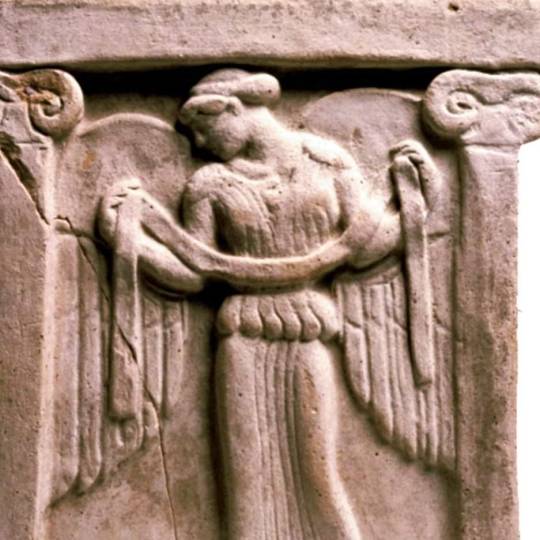
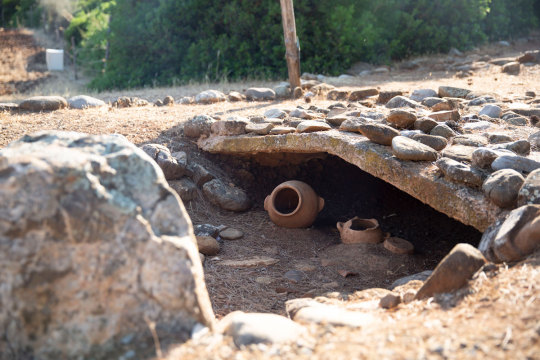
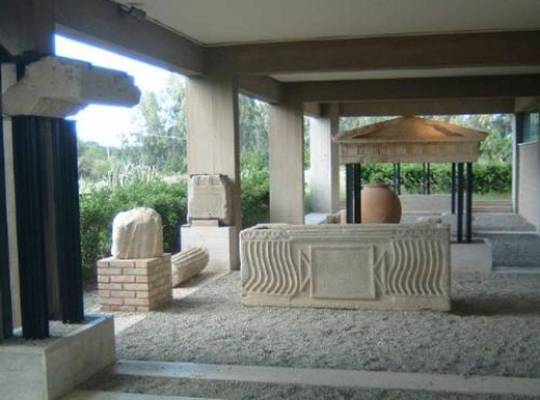
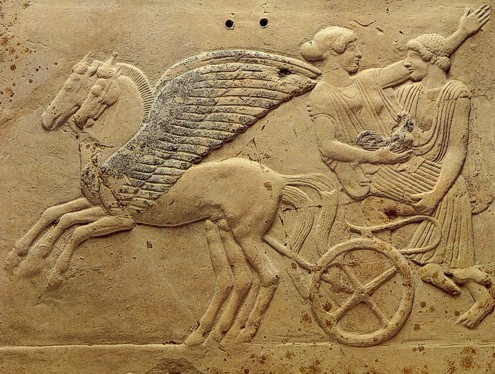

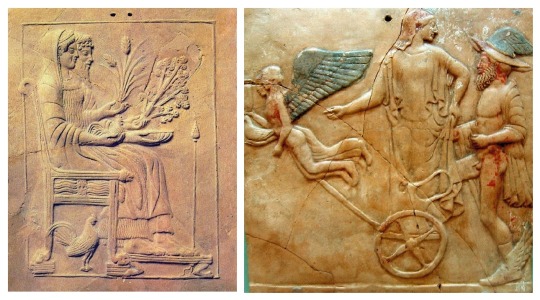
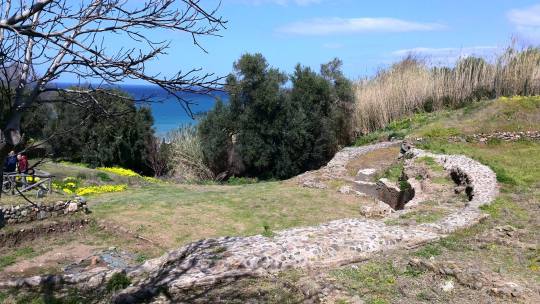

Locri, Calabria, Italy
Locri Epizefiri (Greek Λοκροί Ἐπιζεφύριοι; from the plural of Λοκρός, Lokros, "a Locrian" and ἐπί epi, "on", Ζέφυρος (Zephyros), West Wind, thus "The Western Locrians") was founded about 680 BC on the Italian shore of the Ionian Sea, near modern Capo Zefirio, in Southern Italy's Calabria, by the Locrians, apparently by Opuntii (East Locrians) from the city of Opus, but including Ozolae (West Locrians) and Lacedaemonians.
Due to fierce winds at an original settlement, the settlers moved to the present site. After a century, a defensive wall was built. Outside the city there are several necropoleis, some of which are very large.
Locris was the site of two great sanctuaries, that of Persephone and of Aphrodite. Perhaps uniquely, Persephone was worshiped as protector of marriage and childbirth, a role usually assumed by Hera, and Diodorus Siculus knew the temple there as the most illustrious in Italy.
In the early centuries Locris was allied with Sparta, and later with Syracuse. It founded two colonies of its own, Hipponion and Medma.
During the 5th century BC, votive pinakes in terracotta were often dedicated as offerings to the goddess, made in series and painted with bright colors, animated by scenes connected to the myth of Persephone. Many of these pinakes are now on display in the National Museum of Magna Græcia in Reggio Calabria. Locrian pinakes represent one of the most significant categories of objects from Magna Graecia, both as documents of religious practice and as works of art. In the iconography of votive plaques at Locri, her abduction and marriage to Hades served as an emblem of the marital state, children at Locri were dedicated to Persephone, and maidens about to be wed brought their peplos to be blessed.
During the Pyrrhic Wars (280-275 BC) fought between Pyrrhus of Epirus and Rome, Locris accepted a Roman garrison and fought against the Epirote king. However, the city changed sides numerous times during the war. Bronze tablets from the treasury of its Olympeum, a temple to Zeus, record payments to a 'king', generally thought to be Pyrrhus. Despite this, Pyrrhus plundered the temple of Persephone at Locris before his return to Epirus, an event which would live on in the memory of the Greeks of Italy. At the end of the war, perhaps to allay fears about its loyalty, Locris minted coins depicting a seated Rome being crowned by 'Pistis', a goddess personifying good faith and loyalty, and returned to the Roman fold.
The city was abandoned in the 5th century AD. The town was finally destroyed by the Saracens in 915. The survivors fled inland about 10 kilometres (6 mi) to the town Gerace on the slopes of the Aspromonte.
Today, the modern town of Locri boasts a National Museum and an Archaeological Park, etirely dedicated to the ancient Greek city. The museum preserves the most important findings of the time, such as vases, pinakes, tools used in everyday life, architectural remains from the various excavation area.
Follow us on Instagram, @calabria_mediterranea
#locri#calabria#italy#italia#south italy#southern italy#mediterranean#mediterranean sea#magna graecia#magna grecia#archaeology#archeology#ancient#art#ancient art#history#ancient history#greek#greek art#ancient greece#landscape#italian#italian landscape#landscapes#europe#persephone#olive trees#olive tree#nature#nature photography
73 notes
·
View notes
Text
Hetalia Characters & How I Think They Would Fare In a Teen Slasher Movie
(Ain't gonna lie most of these bitches die & you know it)
(Based on a lil fic I started last Halloween and gave up on. I cleaned it up and made it sound more like a movie plot rather than just a messy fic outline.)
Movie Plot: (Just so you're like not confused on what is supposed to be happening here)
After the untimely death of their beloved high school friend, a group of young adults meet up for their annual camping trip to honor the death of their old friend (Italy). They all have grown apart over the years getting their own lives and separate friends. They have proclaimed this to be the last camping trip they will do before going their separate ways for good. Most of the group is happy for the tradition to end, some saddened feeling like they are just forgetting their friend by ending his tradition. Their finale camping trip is cut short when the group is plagued by an hooded figure seemingly hunting the group for sport, or is revenge? wooooo~~ scaaary.
Nyo!America- Is the final girl aka the 'main girl' (This is how I will refer to her to save time) the movie is centered around. we are rooting for her the entire time. Think Sally in Texas Chainsaw, or Sidney Prescott in Scream. (Lives)
America- America would be the mean jock/popular/rich guy, probably had a girlfriend he wasn't very nice too. Does not really want to be there. His sister is the main girl. (Gets killed but does get a few good swings in on the killer/monster though. You don't really care that he dies he was a dick anyway.)
England- The nerdy book worm kid that you're like "surely the killer will take pity on him" but they don't. Probably one if the first few to die before everyone is really aware there is a killer about. They find his body later while running away (Gets killed and you are meant to feel bad a bout it. His death is uncalled for and not deserved. Used to set a tone for how cold hearted the killer/monster really is.)
Canada- Ends up getting away. He's sent to get help with the only working care after the killer sabotages the rest of them. He drives to the nearest gas station 10 miles away and no one believes him. Instead of going back he leaves everyone there stranded. It's a real dick move. But he does end up coming back at the end to pick up the survivors. Like thanks I guess? (Lives, but a what cost honestly. Can you blame him though?)
Russia- Is helping the killer/monster in some way. His betrayal is a big reveal at the end. It shows little flash backs showing him thwarting the heroes at every turn. He has a change of heart last second. (Gets killed by the killer close to the end after siding with the heroes.)
China- He is pushed off a cliff by Russia (secretly) when they all split up to find help and everyone thinks he's dead but he comes back later limping out of the woods all cut up to rejoin with his friends after the killer is dead. Everyone who lived is really happy to see him. (Lives)
Italy- Gets killed pretty brutally by the killer several years before the story stars. He was known to be someone that everyone generally liked. His gruesome death took their small town by storm. What's worse is his killer was never caught and remains at large getting away with it so it seems. The whole movie is centered around his friends getting together for an annual camping trip several years after his death. (Killed)
Romano- Surprisingly, he survives! He is the one who is with the main girl the entire time. He probably get's hurt really bad at some point. Loses a finger, breaks his arm or leg, and or gets stabbed. You are lead to believe that he will die at one point and he confesses his feelings for the main girl. The main girl leaves him some place for awhile saying she will "go get help". She comes back with Japan. (Lives)
~Everyone else is down below~
Germany- The voice of reason. The one who ends up making a great sacrifice to take out the killer/ monster. Stand back to hold the door for everyone so they can run. It was his car Canada stole. He feels responsible for the group since it was his idea to go camping one more time in the first place. (Killed/sacrifices himself)
Japan- Because he was driving in from out of state he was supposed to meet the group at the campsite. On his way he’s run off the road by the killer/monster. He never shows up and no one can get ahold of him (no cell service of course). We are lead to think he is dead him being the killers first victim but he’s found later knocked out in his car by the main girl. He’s hurt but only has a few cuts and bruises (lives)
Prussia- At night he goes off by himself to wait for Japan's car to pull in to the camp site. So he could lead him to where they made camp. They are still hoping he'll show but he is instead found by the killer (Killed)
Austria- Thinks everyone is playing a joke on him. He does not think it's funny that everyone 'keeps disappearing' and thinks it's bad taste considering the reason they are all on this trip. Everyone begs him not to break off from the group but he goes off by himself anyway. (Killed)
Spain- Is actually the killer hiding behind a charming personality & his devilishly good looks. Why was he so mad at his former friend group that he felt the need to pick them off one by one? Don't know never got that far tbh. Was going to work that out as I go. Probably a pretty shit reason though imo. Most likely jealousy over something.(Dies...OR DOES HE? Yeah he does.)
#hetalia#hws america#hws england#hws canada#hws china#hws russia#hws france#hws italy#nyo!america#hws spain#hws austria#hws germany#hws romano#hws prussia#aph america#aph england#aph italy#aph canada#aph russia#aph germany#aph romano#aph china#aph japan#aph spain#aph austria
62 notes
·
View notes
Note
A little different his time! We're going to Italy for this next one.
I'd love to see Felix/and or Demetri(separate) with a mate that doesn't live in the castle. There is a fire in the city and while most people are running away from it she's determined to help people out of the building. By the end her hair is singed, she smells of smoke, her skin has minor cuts/burns and is darker due to soot. Her vampire mate is NOT happy she put herself in that situation but knows how stubborn she is and is just happy to hold her after and won't be letting her go for awhile. Please and thank you!!
Ah so two different fics once more, sounds simply enough :)
❝as long as you’re okay❞

✭ pairing : felix volturi x reader x demetri volturi
✭ fandom : twilight x reader
✭ summary : (y/n) decides to play hero leading to her sustaining some injuries, her mates aren’t too happy about that but luckily she’s okay and Al that’s all that matters
✭ authors note : as always this is divided between 3 sections
✭ twilight masterlist





Felix :
Felix, a loyal member of the Volturi guard, had found his mate in (Y/n). Their connection was undeniable, but unlike most of the Volturi, (Y/n) chose to live outside the castle walls, immersed in the human world. She had a compassionate heart that couldn't bear to stay away from those in need.
One fateful day, a fire engulfed a building in the city where (Y/n) lived. Panic spread as people fled from the scene, desperate to escape the engulfing flames. But (Y/n), driven by her unwavering sense of duty, was determined to help those trapped inside.
Ignoring the danger, (Y/n) rushed towards the burning building, her heart filled with a mix of fear and determination. She knew the risks, but her instincts pushed her forward, urging her to save lives. As she entered the inferno, debris fell around her, flames licking at her skin and smoke filling her lungs.
Time seemed to blur as (Y/n) focused on her mission, pulling people from the wreckage, guiding them to safety. Her hair became singed, her clothes covered in soot, and her once pristine skin bore minor cuts and burns. But she persevered, driven by an indomitable spirit.
When the last survivor was safely away from the building, (Y/n) emerged, her body exhausted and her spirit weary. But her heart swelled with a sense of accomplishment. She had made a difference in the lives of those she had saved.
However, as (Y/n) emerged from the scene of the fire, she was met with the stern gaze of Felix. His eyes filled with a mix of concern and anger, his vampire instincts having sensed the danger she had put herself in. He rushed to her side, his arms wrapping protectively around her.
"(Y/n), what were you thinking?" Felix's voice was filled with a potent mix of worry and frustration. "You could have been seriously hurt, or worse!"
(Y/n) looked up at him, her eyes filled with determination and defiance. "I couldn't stand by and do nothing, Felix. People needed help, and I couldn't turn my back on them."
Felix sighed, his anger giving way to understanding. He knew how stubborn (Y/n) could be, and he also knew that her compassionate nature was what drew him to her. He gently brushed away the soot from her face, his touch filled with tenderness and affection.
"I'm just glad you're safe," Felix said softly, his voice filled with genuine relief. "But please, promise me you won't put yourself in such danger again."
(Y/n) nodded, her expression serious. "I promise, Felix. I'll be more cautious in the future. But sometimes, I just can't stand by and let others suffer."
Felix pulled her closer, his embrace offering comfort and reassurance. He knew that (Y/n) had a heart that couldn't be contained, and while he worried for her safety, he also admired her bravery.
In that moment, all he wanted was to hold her, to cherish her, and to let her know that he would always be there to protect her, no matter what challenges they faced together.
Demetri :
The city was ablaze with chaos and panic as flames licked at the buildings, devouring everything in their path. People ran in every direction, desperately seeking safety and shelter.
But amidst the chaos, there was one person who stood out from the crowd - (Y/N), the mate of Demetri Volturi. (Y/N) was not like the others in the Volturi castle. She did not reside within the grand walls of the ancient fortress, but instead chose to live among the humans in the city.
Her heart was filled with compassion and a burning desire to help those in need, even if it meant putting herself in harm's way. As the fire raged on, consuming everything in its path, (Y/N) could not stand idly by.
With determination etched on her face, she disregarded her own safety and rushed towards the burning building. Her mind was focused on one thing - saving lives. Ignoring the screams and cries of those around her, (Y/N) fearlessly entered the inferno.
The intense heat licked at her skin, causing her to flinch, but she pressed on. She knew that every second counted, and lives were at stake. With each step she took, (Y/N) could feel the heat intensifying.
Her hair, once flowing and vibrant, was now singed and tangled. The acrid smell of smoke clung to her clothes, seeping into her very being. Her skin bore the marks of her bravery, with minor cuts and burns scattered across her body.
The soot that covered her face and hands had darkened her complexion, a stark contrast to her usual radiance.
Meanwhile, Demetri Volturi, her vampire mate, watched from a distance with a mix of concern and frustration. He knew all too well how stubborn and determined (Y/N) could be. He admired her selflessness, but he also feared for her safety. His instincts screamed at him to swoop in and whisk her away from the danger, but he knew that she would not appreciate his interference.
Finally, the fire began to subside, leaving behind a charred and broken structure. As the last flicker of flame died down, (Y/N) emerged from the wreckage, her body covered in soot and her clothes tattered.
She was weary, but her eyes shone with a sense of fulfillment. Seeing her emerge from the chaos, Demetri's heart swelled with a mix of relief and adoration.
He rushed towards her, pulling her into a tight embrace. He could feel the heat radiating from her body, a reminder of the danger she had willingly faced. "You're safe," he whispered, his voice filled with a mixture of relief and reproach.
“But you shouldn't have put yourself in such danger, my love." (Y/N) smiled weakly, her body still trembling from the adrenaline rush.
“I couldn't just stand by and do nothing," she replied, her voice filled with determination. "I had to help those people, Demetri. It's who I am." Demetri sighed, knowing that he couldn't change her nature.
He held her tightly, vowing to protect her from any harm that may come her way. In that moment, he realized that he couldn't imagine his life without her fiery determination and selflessness.
As they stood there, wrapped in each other's arms, Demetri knew that he would never let her go. He would cherish her, protect her, and support her in all her endeavors, even if it meant facing the flames together.
Felix and Demetri :
In the midst of chaos and panic, flames dancing against the darkening sky, (y/n) raced towards the burning building. It wasn't in her nature to stand idly by when people were in danger. The screams of terrified individuals echoed in her ears as she pushed forward, determined to do what she could to help.
Her movements were swift and focused as she entered the smoke-filled building. Despite the thick clouds of black smoke, (y/n) could hear the cries for help coming from the upper floors. With a heart full of resolve, she pressed on, ignoring the burning sensation in her lungs and the stinging sensation of smoke in her eyes.
Every step she took felt heavy, the weight of the danger and the responsibility she had taken upon herself pressing down on her shoulders. She found herself relying on instincts, guiding her through the smoke-filled corridors to the trapped individuals.
With each person she managed to rescue, (y/n)'s determination grew stronger. She moved with urgency, using her strength to help those who couldn't escape on their own. The fire raged on, consuming everything in its path, but she was undeterred.
By the time she emerged from the building, her clothes were covered in soot, her hair singed, and her skin marked with minor burns and cuts. The smell of smoke clung to her, a testament to the danger she had faced. But she wore a satisfied smile, knowing that she had made a difference.
As she stepped away from the burning building, her mates Felix and Demetri were waiting for her, their expressions a mix of worry and relief. Without a word, they rushed to her side, their arms wrapping around her in a protective embrace.
"(y/n), you could have been hurt," Demetri's voice was laced with concern as he held her close.
Felix's grip tightened around her, his eyes filled with a mixture of relief and annoyance. "Why didn't you wait for us? We could have helped."
(y/n) let out a soft sigh, leaning into their embrace. "I couldn't just stand there and do nothing. People needed help."
Demetri's gaze softened as he brushed a soot-covered strand of hair away from her face. "We understand, but you mean the world to us. We can't bear the thought of losing you."
Felix nodded in agreement, his fingers tracing the cuts and burns on her skin with gentle care. "Next time, please let us know. We want to be there for you, always."
Touched by their concern, (y/n) looked between them, a small smile gracing her lips. "I promise I'll let you know next time. But for now, let's just be grateful that everyone is safe."
With that, the three of them stood there, holding onto each other, finding solace in the warmth of their embrace. The flames may have consumed the building, but the bond between (y/n), Felix, and Demetri had grown stronger in the face of danger, reminding them of the strength of their love and the unbreakable connection they shared.
#x reader#x reader oneshot#x reader one shot#x reader requests#demetri volturi x reader#demetri volturi#demetri volturi x reader x felix volturi#poly volturi x reader#demetri volturi imagine#demetri volturi imagines#felix volturi#felix volturi x reader#felix volturi imagine#felix volturi imagines#twilight scenario#twilight imagine#twilight masterlist#twilight x reader#twilight imagines#volturi imagine#the volturi#volturi#volturi imagines#volturi coven#volturi x reader
188 notes
·
View notes
Text
Daily update post:
Bibi Netanyahu has now officially said that Israel has killed Hamas' 4th most crucial senior. The top 4 Hamas terrorists are, by Israel's order: Yahya Sinwar (#1), the leader in Gaza, Mohammed Deif (#2), the military leader of Hamas in Gaza, Marwan Issa (#3), Deif's second in command, and Saleh al-Arouri (#4), the military leader of Hamas outside of Gaza and the deputy of Hamas' "political bureau."
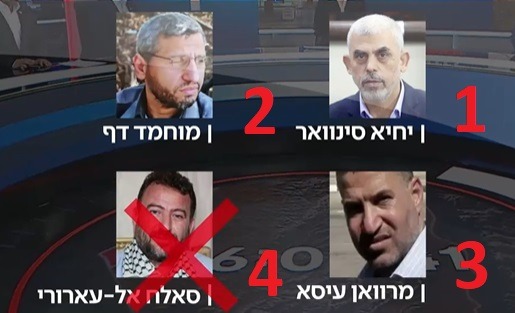
We already had reason to think Israel was behind al-Arouri's death, after the Oct 7 massacre (on Jan 2), but now it's confirmed. Bibi's admission comes while everyone's still trying to understand whether Israel has managed to kill Hamas' 3rd most crucial senior, Marwan Issa, on the night between this Saturday and sunday. So far, Hamas is trying to provide proof he's alive, but apparently there's been no contact with him since Israel's strike. If he has been killed, that would make the other two Hamas seniors in Gaza, Sinwar and Deif, far more afraid for their lives, and maybe more willing to show flexibility in releasing the Israeli hostages to save themselves.

Italy has arrested 3 Palestinians for their intent to carry out terrorist attacks. The attacks were meant to be carried out on what Italy referred to as, "foreign soil," Israel is asking for the extradition of at least one. The three were living in Italy for years based on humanitarian visas. They're said to be a part of the al-Aqsa Martyrs' Brigades. For those who don't know, this was a terrorist organization that was originally receiving orders and funding from Fatah, the ruling party of the Palestinian Authority, but today it has splintered into separate cells, some still affiliated with Fatah, some operating independently, and some linked to Lebanese terrorist organization Hezbollah. They've been defined by the European Union (which Italy as a part of) as a terrorist organization since 2023. At least some of the al-Aqsa Martyrs' Brigades participated in the Oct 7 massacre.
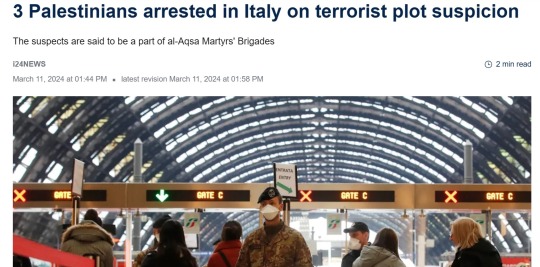
At the Oscars, a director hijacked his own "cerebral" Holocaust movie in order to make a political point, in which he denounced hijacking the Holocaust for political purposes, right before dedicating his reward to a non-Jew (who, as an actual ally to Jews, might not have wanted his dedication anyway, but we'll never know, since she died in 2017. Yep, he hijacked her memory as well for his political message). I just want to share the Oscar winning speech of a Jewish Holocaust survivor and movie producer, who never forgot that when you make movies about this horrific time, it should be first and foremost about remembering the victims. Branko Lustig then dedicated his Oscar for Schindler's List to the Jewish people, by donating it to the Israeli institute of Yad Vashem, the one country in the world where people's access to the memory of the Holocaust will never depend on the good will of a non-Jewish majority. You can see the award when you visit our viewing center, where you can watch tens of thousands of Holocaust survivors' testimonies, and listen to their own voices.
Here's a reminder that most of the Jews who were murdered in or survived the Holocaust, were Zionist, and it's wrong to erase their voices, it's wrong to ignore the survivors who were killed, kidnapped or otherwise victimized by Hamas on Oct 7, it's wrong to ignore that they are still targeted by these terrorists simply for being Jews, and it's wrong to throw them under the bus in a hypocritical speech, which reverses who were the first ones to be de-humanized in this conflict, when they erased our Jewish historical connection to the land, our native right to live in it, our efforts to make peace with the Arabs, and the fact that anti-Jewish violence in Israel preceded by decades the existence of the Jewish state. The violence of Oct 7, of the biggest massacre of Jews since the Holocaust, is a direct result of decades of antisemitic de-humanization of Jews before the conflict even had two sides, and no one has a right to ignore that, or hijack the memory of the Holocaust to do it.
I wrote about Canada, and now Sweden is also resuming its funding of UNRWA, and the European Union is also releasing 50 million Euros (over 54.6 million dollars) for UNRWA funding, despite the fact that nothing has actually been done about the symbiosis between UNRWA and Palestinian terrorism. I have zero faith in the UN self-investigation of its own agency, but not even that has been concluded. By starting the funding again without taking even a single measure to make sure that their money isn't going to anti-Jewish terrorism, these countries are sending a CLEAR message that they do not care about the lives of Israelis and Jews. The idea that they have to, because otherwise how would Palestinians get humanitarian aid, is a fig leaf they're hiding behind. Already, I heard one journalist mention that over 50% of the humanitarian aid is being distributed in Gaza by organizations that are not UNRWA, but more than that, in places which had suffered much worse humanitairan crises, and where the UN had no unique local agency (which is everywhere outside the one conflict involving a Jewish state), the UN has never had trouble establishing temporary aid infrastructure. They had no need for an agency operating in that locale for so long, that it has become a party to the conflict. So why is Gaza different!? Why do the lives of Jews and Israelis not matter enough to search for solutions, proven to have worked before, other than funding a terrorist-embedded organization?
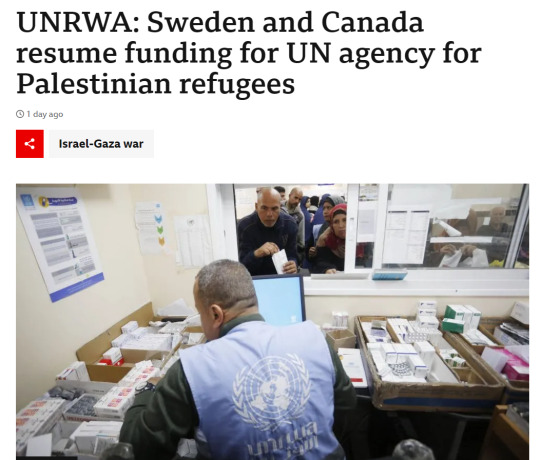
Today is the first day of Ramadan in the Islamic year of 1445. Today I wanna wish a Ramadan mubarak to all peace loving Muslims, who uphold the true peace loving meaning of Ramadan, but my heart and my wishes especially go out to (left to right in the pics below) 53 years old Yussuf al-Ziadna, his son 22 years old Hamza al-Ziadna, and 53 years old Farchan al-Qaddi, the three Muslim Israeli hostages still in Gazan captivity. May they get to be released soon and observe this month together with their families, in their own home, in the true spirit of this holiday.
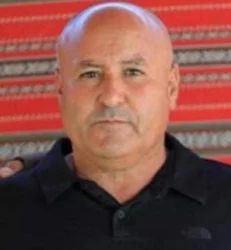
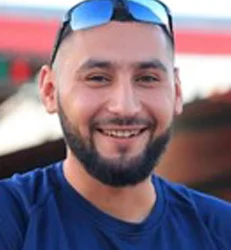

(for all of my updates and ask replies regarding Israel, click here)
#israel#antisemitism#israeli#israel news#israel under attack#israel under fire#terrorism#anti terrorism#hamas#antisemitic#antisemites#jews#jew#judaism#jumblr#frumblr#jewish#ramadan#unrwa#un
103 notes
·
View notes
Text
DeSantis is calling for a US representative to be denaturalized and deported.
The apparent cause? Said representative, Ilhan Omar, is a naturalized Somali-American citizen who recently gave a speech where she referred to herself as "Somali first, and Muslim second," without mentioning America.
“Expel from Congress, denaturalize and deport,” urged Ron DeSantis about U.S. Rep. Ilhan Omar, who is taking criticism from the Right for comments she made privileging Somalia over the United States.
As Newsweek notes, Omar recently told a crowd of Somali American constituents that she was “Somalian first, Muslim second” and “here to protect the interests of Somalia from inside the U.S. system.”
She also claimed that while she is in Congress, “no one will take Somalia’s sea. The United States will not back others to rob us.” There, she was objecting to a deal struck by Somaliland to give Ethiopia access to the ocean.
- Florida Politics
I'm not going to comment on the discussion of who deserves to own the disputed territories she's actually talking about in her speech, because quite frankly I barely know enough about that area to understand why Italy caused the Ethiopia/Eritrea/Djibouti port access issue, but I will say that it is a frankly ridiculous cause for STRIPPING SOMEONE OF THEIR CITIZENSHIP AND DEPORTING THEM. The woman was talking about her ethnic and cultural background and promising to protect people of that specific background. This is a normal thing for politicians to do. It's often their platform.
And let's not pretend that "I will strengthen ties with/support this ally" is uncommon. It's just usually the EU or Israel or something, instead of Somalia.
... possibly the actual cause, politically, is that she has been supporting Rep. Tlaib in pro-Palestine activities, and has been calling for reparations to be paid to the families of civilians killed by US operations in Somalia.
“Congress appropriates $3 million every year specifically to make payments to civilian victims and survivors of U.S. operations,” Omar said. “However, those funds have never been used in Somalia — despite confirmed civilian deaths there.”
- The Intercept
So, you know. Her other "hold America accountable in the middle east" activities probably are part of this.
Plus the usual racism, misogyny, and Islamophobia of the GOP.
64 notes
·
View notes
Text
Denazification, truth and reconciliation, and the story of Germany's story
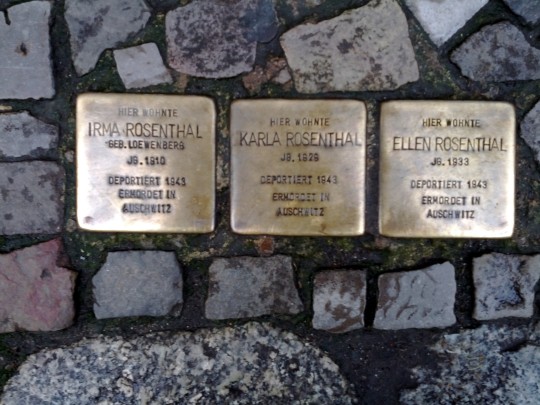
Germany is the “world champion in remembrance,” celebrated for its post-Holocaust policies of ensuring that every German never forgot what had been done in their names, and in holding themselves and future generations accountable for the Nazis’ crimes.
All my life, the Germans have been a counterexample to other nations, where the order of the day was to officially forget the sins that stained the land. “Least said, soonest mended,” was the Canadian and American approach to the genocide of First Nations people and the theft of their land. It was, famously, how America, especially the American south, dealt with the legacy of slavery and Jim Crow.
Silence begets forgetting, which begets revisionism. The founding crimes of our nations receded into the mists of time and acquired a gauzy, romantic veneer. Plantations — slave labor camps where work was obtained through torture, maiming and murder — were recast as the tragiromantic settings of Gone With the Wind. The deliberate extinction of indigenous peoples was revised as the “taming of the New World.” The American Civil War was retold as “The Lost Cause,” fought over states’ rights, not over the right of the ultra-wealthy to terrorize kidnapped Africans and their descendants into working to death.
This wasn’t how they did it in Germany. Nazi symbols and historical revisionism were banned (even the Berlin production of “The Producers” had to be performed without swastikas). The criminals were tried and executed. Every student learned what had been done. Cash reparations were paid — to Jews, and to the people whom the Nazis had conquered and brutalized. Having given in to ghastly barbarism on an terrifyingly industrial scale, the Germans had remade themselves with characteristic efficiency, rooting out the fascist rot and ensuring that it never took hold again.
But Germany’s storied reformation was always oversold. As neo-Nazi movements sprang up and organized political parties — like the far-right Alternative für Deutschland — fielded fascist candidates, they also took to the streets in violent mobs. Worse, top German security officials turned out to be allied with AfD:
https://www.wsws.org/en/articles/2018/08/04/germ-a04.html
Neofascists in Germany had fat bankrolls, thanks to generous, secret donations from some of the country’s wealthiest billionaires:
https://www.spiegel.de/international/germany/billionaire-backing-may-have-helped-launch-afd-a-1241029.html
And they broadened their reach by marrying their existing conspiratorial beliefs with Qanon, which made their numbers surge:
https://www.thedailybeast.com/how-fringe-groups-are-using-qanon-to-amplify-their-wild-messages
Today, the far right is surging around Europe, with the rot spreading from Hungary and Poland to Italy and France. In an interview with Jacobin’s David Broder, Tommaso Speccher a researcher based in Berlin, explores the failure of Germany’s storied memory:
https://jacobin.com/2023/07/germany-nazism-holocaust-federal-republic-memory-culture/
Speccher is at pains to remind us that Germany’s truth and reconciliation proceeded in fits and starts, and involved compromises that were seldom discussed, even though they left some of the Reich’s most vicious criminals untouched by any accountability for their crimes, and denied some victims any justice — or even an apology.
You may know that many queer people who were sent to Nazi concentration camps were immediately re-imprisoned after the camps were liberated. Both Nazi Germany and post-Nazi Germany made homosexuality a crime:
https://time.com/5953047/lgbtq-holocaust-stories/
But while there’s been some recent historical grappling with this jaw-dropping injustice, there’s been far less attention given to the plight of the communists, labor organizers, social democrats and other leftists whom the Nazis imprisoned and murdered. These political prisoners (and their survivors) struggled mightily to get the reparations they were due.
Not only was the process punitively complex, but it was administered by bureaucrats who had served in the Reich — the people who had sent them to the camps were in charge of deciding whether they were due compensation.
This is part of a wider pattern. The business-leaders who abetted the Reich through their firms — Siemens, BMW, Hugo Boss, IG Farben, Volkswagon — were largely spared any punishment for their role in the the Holocaust. Many got to keep the riches they acquired through their part on an act of genocide.
Meanwhile, historians grappling with the war through the “Historikerstreit” drew invidious comparisons between communism and fascism, equating the two ideologies and tacitly excusing the torture and killing of political prisoners (this tale is still told today — in America! My kid’s AP history course made this exact point last year).
The refusal to consider that extreme wealth, inequality, and the lust for profits — not blood — provided the Nazis with the budget, materiel and backing they needed to seize control in Germany is of a piece with the decision not to hold Germany’s Nazi-enabling plutocrats to account.
The impunity for business leaders who collaborated with the Nazis on exploiting slave labor is hard to believe. Take IG Farben, a company still doing a merry business today. Farben ran a rubber factory on Auschwitz slave labor, but its executives were frustrated by the delays occasioned by the daily 4.5m forced march from the death-camp to its factory:
https://pluralistic.net/2023/06/02/plunderers/#farben
So Farben built Monowitz, its own, private-sector concentration camp. IG Farben purchased 25,000 slaves from the Reich, among them as many children as possible (the Reich charged less for child slaves).
Even by the standards of Nazi death camps, Monowitz was a charnel house. Monowitz’s inmates were worked to death in just three months. The conditions were so brutal that the SS guards sent official complaints to Berlin. Among their complaints: Farben refused to fund extra hospital beds for the slaves who were beaten so badly they required immediate medical attention.
Farben broke the historical orthodoxy about slavery: until Monowitz, historians widely believed that enslavers would — at the very least — seek to maintain the health of their slaves, simply as a matter of economic efficiency. But the Reich’s rock-bottom rates for fresh slaves liberated Farben from the need to preserve their slaves’ ability to work. Instead, the slaves of Monowitz became disposable, and the bloodless logic of profit maximization dictated that more work could be attained at lower prices by working them to death over twelve short weeks.
Few of us know about Monowitz today, but in the last years of the war, it shocked the world. Joseph Borkin — a US antitrust lawyer who was sent to Germany after the war as part of the legal team overseeing the denazification program — wrote a seminal history of IG Farben, “The Crime and Punishment of I.G. Farben”:
https://www.scribd.com/document/517797736/The-Crime-and-Punishment-of-I-G-Farben
Borkin’s book was a bestseller, which enraged America’s business lobby. The book made the connection between Farben’s commercial strategies and the rise of the Reich (Farben helped manipulate global commodity prices in the runup to the war, which let the Reich fund its war preparations). He argued that big business constituted a danger to democracy and human rights, because its leaders would always sideline both in service to profits.
US companies like Standard Oil and Dow Chemicals poured resources into discrediting the book and smearing Borkin, forcing him into retirement and obscurity in 1945, the same year his publisher withdrew his book from stores.
When we speak of Germany’s denazification effort, it’s as a German program, but of course that’s not right. Denazification was initiated, designed and overseen by the war’s winners — in West Germany, that was the USA.
Those US prosecutors and bureaucrats wanted justice, but not too much of it. For them, denazification had to be balanced against anticommunism, and the imperatives of American business. Nazi war criminals must go on trial — but not if they were rocket scientists, especially not if the USSR might make use of them:
https://en.wikipedia.org/wiki/Wernher_von_Braun
Recall that in the USA, the bizarre epithet “premature antifascist” was used to condemn Americans who opposed Nazism (and fascism elsewhere in Europe) too soon, because these antifascists opposed the authoritarian politics of big business in America, too:
https://www.thenation.com/article/archive/premature-antifascist-and-proudly-so/
When 24 Farben executives were tried at Nuremberg for the slaughter at Monowitz, then argued that they had no choice but to pursue slave labor — it was their duty to their shareholders. The judges agreed: 19 of those executives walked.
Anticommunism hamstrung denazification. There was no question that German elites and its largest businesses were complicit in Nazi crimes — not mere suppliers, but active collaborators. Antifacism wasn’t formally integrated into the denazification framework until the 1980s with “constitutional patriotism,” which took until the 1990s to take firm root.
The requirement for a denazification program that didn’t condemn capitalism meant that there would always be holes in Germany’s truth and reconciliation process. The newly formed Federal Republic set aside Article 10 of the Nuremberg Charter, which would hold all members of the Nazi Party and SS responsible for their crimes. But Article 10 didn’t survive contact with the Federal Republic: immediately upon taking office, Konrad Adenauer suspended Article 10, sparing 10 million war criminals.
While those spared included many rank-and-file order-followers, it also included many of the Reich’s most notorious criminals. The Nazi judge who sent Erika von Brockdorff to her death for her leftist politics was given a judge’s pension after the war, and lived out his days in a luxurious mansion.
Not every Nazi was pensioned off — many continued to serve in the post-war West German government. Even as Willy Brandt was demonstrating historic remorse for Germany’s crimes, his foreign ministry was riddled with ex-Nazi bureaucrats who’d served in Hitler’s foreign ministry. We still remember Brandt’s brilliant 1973 UN speech on the Holocaust:
https://www.willy-brandt-biography.com/historical-sources/videos/speech-uno-new-york-1973/
But recollections of Brandt’s speech are seldom accompanied by historian Götz Aly’s observation that Brandt couldn’t have given that speech in Germany without serious blowback from the country’s still numerous and emboldened antisemites (Brandt donated his Nobel prize money to restore Venice’s Scuola Grande Tedesca synagogue, but ensured that this was kept secret until after his death).
All this to say that Germany’s reputation as “world champions of memory” is based on acts undertaken decades after the war. Some of Germany’s best-known Holocaust memorials are very recent, like the Wannsee Conference House (1992), the Memorial to the Murdered Jews of Europe (2005), and the Topography of Terror Museum in (2010).
Germany’s remembering includes an explicit act of forgetting — forgetting the role Germany’s business leaders and elites played in Hitler’s rise to power and the Nazi crimes that followed. For Speccher, the rise of neofacist movements in Germany can’t be separated from this selective memory, weighed down by anticommunist fervor.
And in East Germany, there was a different kind of incomplete rememberance. While the DDR’s historians and teachings emphasized the role of business in the rise of fascism, they excluded all the elements of Nazism rooted in bigotry: antisemitism, homophobia, sectarianism, and racism. For East German historians, Nazism wasn’t about these, it was solely “the ultimate end point of the history of capitalism.”
Neither is sufficient to prevent authoritarianism and repression, obviously. But the DDR is dust, and the anticommunism-tainted version of denazification is triumphant. Today, Europe’s wealthiest families and largest businesses are funneling vast sums into far-right “populist” parties that trade in antisemitic “Great Replacement” tropes and Holocaust denial:
https://corporateeurope.org/sites/default/files/2019-05/Europe%E2%80%99s%20two-faced%20authoritarian%20right%20FINAL_1.pdf
And Germany’s coddled aristocratic families and their wealthy benefactors — whose Nazi ties were quietly forgiven after the war — conspire to overthrow the government and install a far-right autocracy:
https://www.reuters.com/world/europe/25-suspected-members-german-far-right-group-arrested-raids-prosecutors-office-2022-12-07/
In recent years, I’ve spent a lot of time thinking about denazification. For all the flaws in Germany’s remembrance, it stands apart as one of the brightest lights in national reckonings with unforgivable crimes. Compare this with, say, Spain, where the remains of fascist dictator Francisco Franco were housed in a hero’s monument, amidst his victims’ bones, until 2019:
https://en.wikipedia.org/wiki/Pedro_S%C3%A1nchez#Domestic_policy
What do you do with the losers of a just war? “Least said soonest mended” was never a plausible answer, and has been a historical failure — as the fields of fluttering Confederate flags across the American south can attest (to say nothing of the failure of American de-ba’athification in Iraq):
https://en.wikipedia.org/wiki/De-Ba%27athification
But on the other hand, people who lose the war aren’t going to dig a hole, climb in and pull the dirt down on top of themselves. Just because I think Germany’s denazification was hobbled by the decision to lets its architects and perpetrators walk free, I don’t know that I would have supported prison for all ten million people captured by Article 10.
And it’s not clear that an explicit antifascism from the start would have patched the holes in German denazification. As Speccher points out, Italy’s postwar constitution was explicitly antifascist, the nation “steeped in institutional anti-fascism.” Postwar Italian governments included prominent resistance fighters who’d fought Mussolini and his brownshirts.
But in the 1990s, “the end of the First Republic” saw constitutional reforms that removed antifascism — reforms that preceded the rise of the corrupt authoritarian Silvio Berlusconi — and there’s a line from him to the neofascists in today’s ruling Italian coalition.
Is there any hope for creating a durable, democratic, anti-authoritarian state out of a world run by the descendants of plunderers and killers? Can any revolution — political, military or technological — hope to reckon with (let alone make peace with!) the people who have brought us to this terrifying juncture?
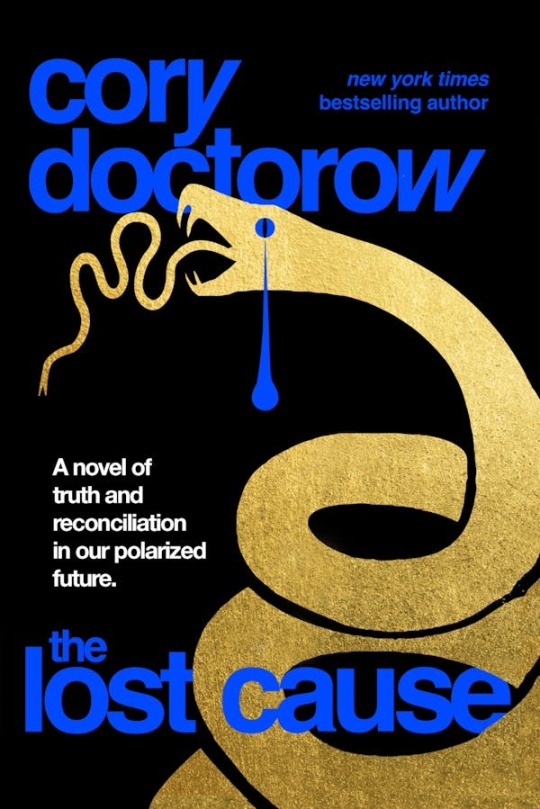
[Image ID: The Tor Books cover for ‘The Lost Cause,’ designed by Will Staehle, featuring the head of the snake on the Gadsen ‘Don’t Tread on Me’ flag, shedding a tear.]
Like I say, this is something I’ve spent a lot of time thinking about — not just how we might get out of this current mess, but how we’ll stay out of it. As is my wont, I’ve worked out my anxieties on the page. My next novel, The Lost Cause, comes out from Tor Books and Head of Zeus in November:
https://us.macmillan.com/books/9781250865939/the-lost-cause
Lost Cause is a post-GND utopian novel about a near-future world where the climate emergency is finally being treated with the seriousness and urgency it warrants. It’s a world wracked by fire, flood, scorching heat, mass extinctions and rolling refugee crises — but it’s also a world where we’re doing something about all this. It’s not an optimistic book, but it is a hopeful one. As Kim Stanley Robison says:
This book looks like our future and feels like our present — it’s an unforgettable vision of what could be. Even a partly good future will require wicked political battles and steadfast solidarity among those fighting for a better world, and here I lived it along with Brooks, Ana Lucía, Phuong, and their comrades in the struggle. Along with the rush of adrenaline I felt a solid surge of hope. May it go like this.
The Lost Cause is a hopeful book, but it’s also a worried one. The book is set during a counter-reformation, where an unholy alliance of seagoing anarcho-capitalist wreckers and white nationalist militias are trying to seize power, snatching defeat from the jaws of the fragile climate victory. It’s a book about the need for truth and reconciliation — and its limits.
As Bill McKibben says:
The first great YIMBY novel, this chronicle of mutual aid is politically perceptive, scientifically sound, and extraordinarily hopeful even amidst the smoke. Forget the Silicon Valley bros — these are the California techsters we need rebuilding our world, one solar panel and prefab insulated wall at a time.
We’re currently in the midst of a decidedly unjust war — the war to continue roasting the planet, a war waged in the name of continuing enrichment of the world’s already-obscenely-rich oligarchs. That war requires increasingly authoritarian measures, increasing violence and repression.
I believe we can win this war and secure a habitable planet for all of us — hell, I believe we can build a world of comfort and abundance out of its ashes, far better than this one:
https://tinyletter.com/metafoundry/letters/metafoundry-75-resilience-abundance-decentralization
But even if that world comes to being, there will be millions of people who hate it, a counter-revolution in waiting. These are our friends, our relatives, our neighbors. Figuring out how to make peace with them — and how to hold their most culpable, most powerful leaders to account — is a project that’s as important, and gigantic, and uncertain, as a just transition is.

Next weekend, I’ll be at San Diego Comic-Con:
Thu, Jul 20 16h: Signing, Tor Books booth #2802 (free advance copies of The Lost Cause— Nov 2023 — to the first 50 people!)
Fri, Jul 21 1030h: Wish They All Could be CA MCs, room 24ABC (panel)
Fri, Jul 21 12h: Signing, AA09
Sat, Jul 22 15h: The Worlds We Return To, room 23ABC (panel)

If you'd like an essay-formatted version of this thread to read or share, here's a link to it on pluralistic.net, my surveillance-free, ad-free, tracker-free blog:
https://pluralistic.net/2023/07/19/stolpersteine/#truth-and-reconciliation

[Image ID: Three 'stumbling stones' ('stolpersteine') set into the sidewalk in the Mitte, in Berlin; they memorialize Jews who lived nearby until they were deported to Auschwitz and murdered.]
#pluralistic#stolpersteine#historians' dispute#Historikerstreit#nazis#godwin's law#mussolini#berlusconi#italy#antifa#fascism#history#truth and reconciliation#the lost cause#denazification
246 notes
·
View notes